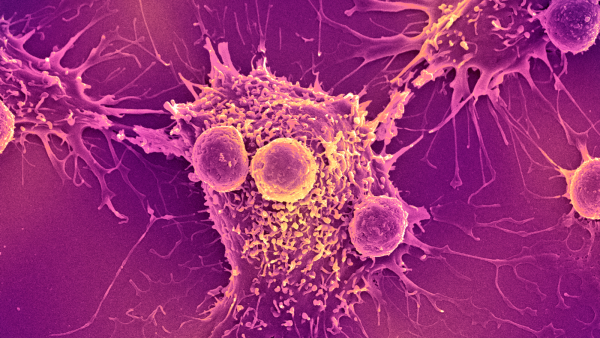
Some studies have linked regular cannabis use to an increased risk of certain cancers. What's the reason? (Image: Catherine Falls Advertising/Getty Images)
Cannabis smoke may be perceived as less aggressive than tobacco smoke, but this impression can be misleading. Current data indicate that chemical components of cannabis can have a negative effect on the deep processes of lung tissue. Some studies by scientists have found a correlation between intensive cannabis use and the risk of developing oncological pathologies, including tumors of the head and neck.
Is there a proven link between cannabis and cancer, and if so, what are the underlying mechanisms?
Each inhalation of smoke contains tetrahydrocannabinol (THC), microparticles and carcinogens, also characteristic of tobacco. However, cannabinoids can have a specific effect, gradually changing the immune reactions in the pulmonary system.
You might be interested
-

Increased incidence of early stage diagnosis of certain types of cancer: what factors influence it?
-

The Effects of Chemotherapy on Blood Cells: The Phenomenon of “Premature Aging”
-

Genetic predisposition to diseases: the challenges of risk assessment
“A decrease in the barrier function of the airways, a weakening of the antiviral response, and an increase in inflammatory reactions,” comments Rafael Cuomo, a specialist in the field of cancer prevention and addiction therapy at the University of California, San Diego. Experiments on animal models have shown that cannabis can suppress antitumor and antiviral immunity. Other work has shown that THC reduces the effectiveness of immunotherapy by disrupting the functionality of cells responsible for destroying tumors.
Clinical, cellular, and preclinical studies have shown that cannabis induces a variety of changes in immune function. Chronic use in the respiratory tract results in significant increases in inflammatory proteins. Excessive production of MUC5AC mucin in individual cells indicates the early stages of tissue transformation, and cannabis smoke can disrupt enzyme activity that maintain tissue homeostasis and block genes that respond to toxins.
Alveolar macrophages, the lungs' immune guardians, show a slow response. The circulatory system registers changes in the cytokine profile and minor epigenetic modifications that record the impact.
In short, “cannabis smoke, including THC and other toxic components, can irritate lung tissue and suppress immune defenses,” Sayantan Bhattacharya, a systems biologist at MD Anderson Cancer Center, told Live Science.
However, immunosuppression is only one factor in potential cancer risk. Smoking cannabis can activate intracellular mechanisms, including molecular pathways used by malignant cells to proliferate and metastasize.
One of the key players in this process is the epidermal growth factor receptor (EGFR). In a unique study, Bhattacharya analyzed data from 83 patients with laryngeal cancer and found that cannabis users had increased activity of EGFR and tumorigenesis-related proteins compared to tobacco smokers or individuals without harmful habits.
“EGFR regulates cell growth, regeneration, and survival,” the scientist explains. “Its chronic activation in cannabis users may stimulate uncontrolled cell division, increase genetic damage, and accelerate cancer development, contributing to early onset, aggressive progression, and resistance to therapy.” It is important to note that the findings of the study, which is based on a limited sample of patients with a specific tumor type, require further confirmation.
Bhattacharya identifies two areas for future research: developing realistic laboratory models (organoids, 3D tumors, organ chips) to study the effects of cannabis on EGFR, and analyzing potentially harmful additives in unregulated products.
SEE ALSO
—Cardiovascular risks of cannabis: smoking versus oral use
—Neurocognitive effects of THC: Formation of false memories
—Genomic studies reveal hereditary risk factors for cannabis addiction
Despite laboratory data pointing to biological risks, epidemiological studies have produced conflicting results. Some studies have linked heavy cannabis use to cancer, while others have found no significant correlation. Cuomo emphasizes that the risk may increase with long-term use, according to current scientific understanding.
Notably, Cuomo found no link between cannabis use and early mortality in cancer patients, a phenomenon dubbed the “Cuomo paradox.” Studies have also noted the potential benefits of cannabis in stimulating appetite and reducing nausea during chemotherapy, despite the possible carcinogenic effects of its smoke.
Future research should balance both the therapeutic potential and risks of cannabis.
Disclaimer
The material is for informational purposes only and does not replace specialist consultation.

Anirban Mukhopadhyay, Live Science contributor
A freelance science journalist with a PhD in Genetics and an MSc in Computational Biology. A regular contributor to The Hindu and a contributor to The Wire Science, he is a freelance writer in his spare time, exploring themes of loss, identity and self-actualisation through surreal narratives. His hobbies include Himalayan motorcycle tours and long walks with his dog.
Please verify your public name before posting a comment.
To continue, please sign in again and provide a display name.
Exit Read more

Increase in cases of early diagnosis of oncopathologies: reasons for the trend

Chemotherapeutic drugs and their effect on cellular aging

Genetic risks of diseases: the multifaceted nature of the problem

Rarity of Cardiac Cancer: Causal Factors

THC food poisoning incident: pizza restaurant patrons become intoxicated

Universal Cancer Vaccine: Prospects for Clinical Trials CANNABIS NEWS

THC Food Intoxication: Mass Case at Pizzeria

Cardiovascular risks of cannabis regardless of route of use

Association of Cannabis Use and Head/Neck Cancer

Therapeutic Potential of Cannabis in Oncology: Current Evidence
Sourse: www.livescience.com





